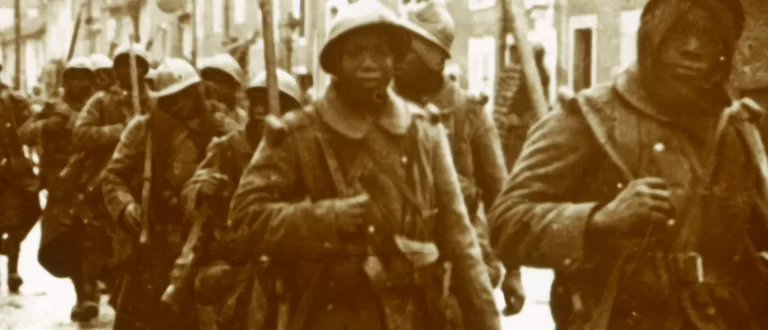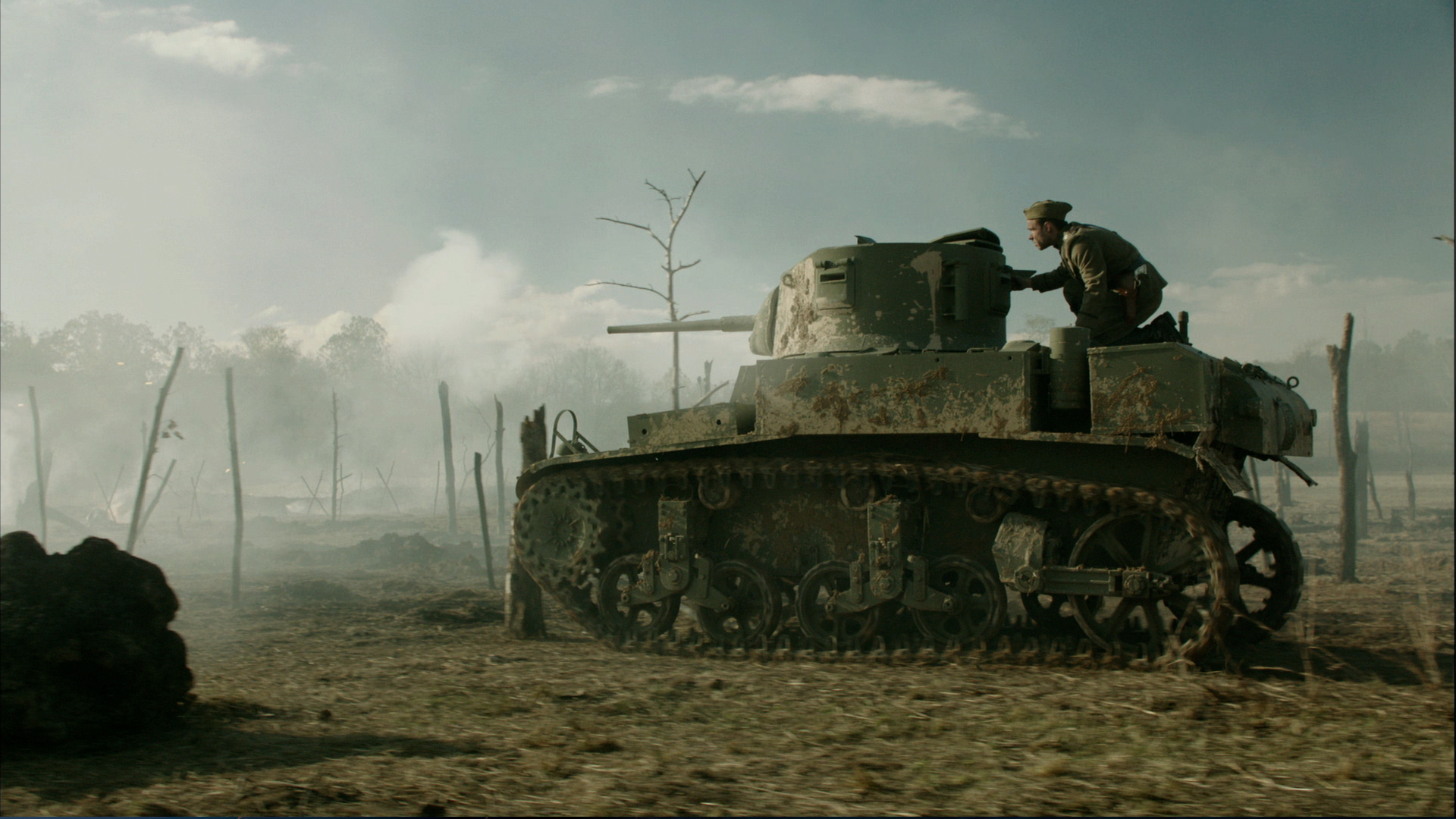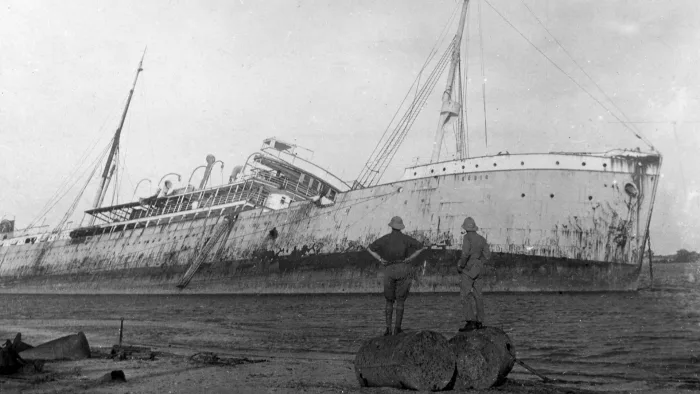
Battles in Africa were waged between colonial powers, but most of those compelled to fight were conscripted Africans.
British and their allies sought to seize the vast colonial empire that the Germans had created in Africa.
PATRICK J. KIGERMAR
World War I commonly brings to mind scenes of Europe in conflict—the first Battle of the Marne, the siege of Verdun, and the bloody struggle of The Somme, as well as the brutal slog of trench warfare on the Western Front.
But the first bullet of the war in late July 1914 wasn’t actually fired in Europe. Instead, as Byron Farwell notes in his book The Great War in Africa, 1914-1918, it was a shot taken by an African soldier in a British uniform at German colonial forces in what is now Togo in West Africa, which back then was a part of Germany’s vast empire in Africa.
Africans Compelled to Fight
In the fighting in Africa between 1914 and 1918, the British and their allies sought to seize the vast colonial empire that the Germans had created in Africa. But on both sides, those who suffered the most in the conflict were Africans, whose lands had been seized from them by the Europeans in the mid to late 1800s.
“The fighting in Africa was between the colonial powers, but most of the soldiers were Africans,” explains Padraic Kennedy, an associate professor of history at York College of Pennsylvania. About two million Africans were compelled to fight in the war, and more than 150,000 African soldiers and bearers lost their lives, with many more wounded and disabled. In addition, many African civilians succumbed to starvation, due to food shortages created by the war’s disruption of agriculture, including armies’ seizure of food supplies and cattle, and the shortage of farmers, hunters and fishermen due to the Europeans’ conscription of African males.
“The conflict in one way or another affected almost every African group and family,” according to Derek Frisby, an associate professor in the Global Studies program at Middle Tennessee State University and an expert in military history.
The war in Africa also was very different from the conflict in Europe, where new technologies such as tanks and aircraft revolutionized warfare.
“The African Great War battles lack much of the industrialization inherent in Europe,” Frisby says. In particular, the artillery used so effectively in European fighting was mostly a non-factor in Africa, according to Frisby. None of the colonial powers had the necessary infrastructure, such as communications for observation and logistics for transporting artillery pieces and keeping them supplied with ammo and maintenance, and it was harder to find suitable terrain. And the forces there often had to make due with older weapons. As a result, Frisby says their greatest effect was in terrifying the native populations, rather than creating devastating barrages.
“Infantry remained the primary combat arm in Great War Africa, not surprisingly taking advantage of the machine gun,” Frisby explains.
In contrast to the often massive battlefield clashes in Europe, African World War I battles tended to be smaller in scale and drawn out over longer time spans. “They were fighting over so much land in Africa, that the fighting was very spread out,” explains Michael Green, associate professor of history at the University of Nevada, Las Vegas. Indeed, the crucial German East Africa campaign between 1916 and 1918, which pitted 165,000 troops from Britain, South Africa, Belgium and Portugal against a German colonial force of 25,000, took place over an area of 750,000 square miles—three times the size of Imperial Germany itself.
Many Africans wanted no part of the war at all. “The French encountered widespread rebellions as they attempted to conscript soldiers in various parts of West Africa,” says Etana Dinka, a history professor at James Madison University.
 Here are some of the key battles of World War I in Africa.
Here are some of the key battles of World War I in Africa.
- First Battle of Garua, August 1914
After taking what is now Togo from the Germans with little resistance, the British and French went after the German colony of Kamerun in what is now Cameroon and sent a combined force of 7,000 British, French and African troops. But they encountered surprisingly tough resistance from the Germans, whose ranks included colonists with military experience, and African troops they had trained.
The Anglo-French force attacked and seized a German fort at Garua (also spelled Garoua) in late August, only to be shocked when the Germans counterattacked and recaptured their fort, killing the British commanding officer there and chasing the British out of the territory, according to an article on the campaign by Camaroonian historian Willibroad Dze-Ngwa. A few days later, the British captured Nsanakang, only to be repulsed by the Germans again. But the Allies learned from their early setbacks, which compelled them to “shift to a more defensive posture and take greater care against a German foe they believed was surrounded and could be easily defeated,” Frisby explains.
- Allied Landing at Douala, September 1914
Still determined to take Kamerun from the Germans, the Allies attacked the crucial seaport of Douala from three directions at once in late September. The coordinated landings “spelled the beginning of the end of German influence in Kamerun,” Frisby says. “As a Marine, I’m always a little biased toward amphibious operations, yet even these relatively small operations demonstrate the value of amphibious operations, especially in Africa where the limited coastal ports became strategic jewels and were vital for any sustained presence.”
- Battle of Tanga, November 1914
In East Africa, the British sought unsuccessfully for four years to defeat a much smaller German force commanded by Col. Paul von Lettow-Vorbeck, a wily and elusive master of unconventional warfare, who repeatedly outsmarted and out-maneuvered them. One of Lettow-Vorbeck’s first victories began when British Maj. Gen. Arthur Aitken sailed from India with an invasion force and staged an amphibious landing at Tanga in what is now Tanzania, in an effort to secure the harbor as a base for future British operations.
Lettow-Vorbeck got wind of the impending attack in time to be ready for the British. When the large-scale assault by Indian troops came on November 4, the Germans rained rifle and machine gun fire on the Indian troops, and counterattacked. The fight had an added complication—hordes of bees, which stung soldiers on both sides and for a time forced them to stop firing. The invading force collapsed, and when the British tried landing the next day, they ended up fleeing in chaos, abandoning their equipment and supplies. After the debacle, Aitken was relieved of his command, according to Hew Stratchan’s The First World War in Africa.
- Battle of Gurin, April 1915
In what was one of the largest German attacks on a British colony, German forces attempted an incursion to Nigeria to threaten British forces and draw them away from their key strategic strongholds in Kamerun. “The steadfast and courageous British defense once again put the Germans on the defensive,” Frisby explains. Despite the successful repulsion of the German attack, they continued to fight for another 10 months in Kamerun, before their final stronghold at Mora fell in February 1916 ending their control of the country.

The Print Collector/Print Collector/Getty Images
- Battle of the Rufiji Delta, July 1915
The Allies mounted an extended Allied naval campaign off the coast of Tanzania, aimed at eliminating a German warship that posed a threat to shipping in the Indian Ocean. The light cruiser Königsberg was a speedy ship, heavily armed with guns and torpedo tubes. After initial efforts failed, in the spring of 1915, they tried a different approach, and dispatched a convoy of vessels small enough to maneuver in the Rufiji River system.
According to the Western Front Association, In July, two small British ships, the Severn and the Mersey, which were designed to sit unusually low in the water to be harder to detect, approached the river mouth. They managed to make it through a gauntlet of German gun batteries on shore and get into the channels of the river system. Guided by a spotter aircraft, they located the Königsberg and began firing upon it. The German cruiser fired back, and hit the Mersey twice, killing four of the crew and inflicted fatal wounds on another two. But the British ships managed to avoid being sunk, and five days later, they braved the German defense once again.
The Mersey was hit again, and lost two more sailors. But this time, the British ships managed to hit the Königsberg and inflict sufficient damage that the Germans had to abandon ship. Though the loss of the cruiser was a devastating blow to the Germans, Lettow-Vorbeck was able to salvage some of the ship’s guns and repurpose them for use on land. As Frisby says, the German officer was able to “extract some victory from the jaws of defeat.”
- Battle of Namakura, July 1918
With the help of intelligence from a captured Portuguese map, Lettow-Vorbeck was able to pounce upon a Portuguese-British garrison in Mozambique. The Portuguese and British lost 200 men, including some who may have drowned in the river or been eaten by crocodile, and the Germans captured another 543, while suffering just nine casualties themselves. More importantly, they captured a badly-needed arsenal, including 10 machine guns, and 813,800 rounds of ammunition, in addition to 350 tons of food, according to historian Hew Strachan’s book, The First World War in Africa. That enabled Lettow-Vorbeck’s forces to keep fighting for months. In fact, he didn’t stop fighting until two weeks after the armistice was signed in Europe, when he learned of the war’s end and surrendered with his remaining 1,500 men to the British in what is now Zaire.
The war resulted in the demise of the German colonial empire in Africa. “The British and the French essentially divided up former German colonies amongst themselves,” Kennedy says. But it also had other permanent effects, including “a significant decline in the aura of European invincibility,” which would contribute to the eventual fall of European colonialism in Africa in the 1950s and 1960s.
___________________
Courtesy: History (Posted on March 6, 2023)